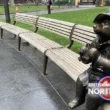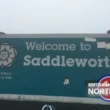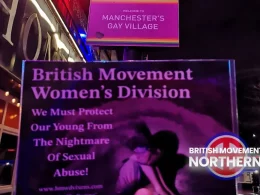A North East Academic Claims Classic Children’s Book Character As A Symbol Of Asylum-Seeking Migrants!
A North East academic has been hailed in a mainstream media outlet for her latest published work, an academic paper that champions the classic children’s book ‘Paddington Bear’ as “Paddington is not only an entertaining fictional character – he is also an illegal immigrant and even an early pioneer of racial equality.”
It is a long-established practice by liberal and left-wing academics to follow Lenin’s strategy of ‘capturing the language and leading the narrative’, to which end the Marxist Frankfurt School of the 1920’s, 30’s, and post-war 1940’s sought to introduce a new range of words and concepts to shape both academic discussion and the language of the news media to shape and direct public thinking.
Infamously, Leon Trotsky introduced the word “racist” to the English language in 1927 and the Frankfurt School took the tactic as a weapon to direct political discourse and to introduce Cultural Marxism to the mainstream. George Orwell expanded on this use and control of language in his classic book “1984” with the idea of “New Speak”. Cultural Marxism has dominated the academic world of the political sciences, specifically sociology and political studies, since the 1960’s.
Now from the University of Sunderland comes this latest manipulation of a children’s fictional character, Michael Bond’s classic tale of a lovable talking bear from Peru, Paddington Bear. The North East online news gushed enthusiastically; “Sunderland professor studies Paddington stories’ attitudes toward migration. Prof Angela Smith has written an academic research paper on the Paddington stories.”
And in approving tones goes on to praise this approach… “A North East professor has used the story of Paddington to study attitudes to immigration. Prof. Angela Smith, from Sunderland University’s Faculty of Education, Society and Creative Industries, says that Paddington is not only an entertaining fictional character – he is also an illegal immigrant and even an early pioneer of racial equality.”
“In her research paper, Paddington Bear: A Case Study of Immigration and Otherness, Prof. Smith has revisited Paddington’s origins in the Britain of 1958, a time of widespread racism and growing multiculturalism, into which a small bear from ‘Darkest Peru’ arrives with a unique perspective on British life.
“She argues that the setting of Michael Bond’s books and the background of his famous bear, are very carefully chosen. His publishers rejected the author’s original idea to have Paddington come from Africa, so Bond subtly chose ‘Darkest’ Peru to keep a tie to the African continent. Paddington’s famous luggage label reading: “Please look after this bear. Thank you” is a reference to author Michael Bond’s experiences of seeing evacuees leaving London during the Second World War – but, significantly, this particular evacuee is coming into London during a critical time in the country’s history.”
Prof. Smith said: “London in the 1950s was becoming rapidly more multicultural than ever before. The first of many large groups of West Indians, called ‘Windrush’ immigrants, arrived, and that cultural mix in London was not always a comfortable one. “In the summer 1958, just months before the first Paddington book was published, some of the worst race riots in Britain ignited, particularly the Notting Hill Riots. It’s no coincidence that the first Paddington stories are specifically set in Notting Hill.”
Paddington arrives in Britain apparently without a name or any other form of identity. He admits he has stowed away on a boat, and Mr and Mrs Brown, who ‘rescue’ him at Paddington station and give him his British name, are aware that he is an illegal immigrant. Paddington, Prof. Smith argues, is a character who is a true pioneer in children’s literature, with views on racial equality and integration that were ahead of their time.
“During the 1970s there was a backlash against inferred and overt racism in children’s books,” she said. “Well-meaning librarians and teachers withdrew some Enid Blyton books, such as Noddy, from children’s libraries and classrooms, and classics such as PL Travers’s Mary Poppins were edited to remove racial stereotypes.
“But as far back as 1958, when the Browns first discovered the small bear on Paddington railway station the impression of him being a stranger in a strange land never leaves those stories. Michael Bond’s Paddington stories subtly investigate racism, and present the case for tolerance and understanding towards immigrants in general.
“The small bear, more than any other character in literature, is quintessentially British, but actively questions the ‘common sense’ elements of British culture in the 1950s and beyond. Those stories’ events are often comic, but their deeper meanings hinge on the ‘long, hard stare’ of that most human of bears.”
All the elements of ‘progressive academia’ and Cultural Marxist political arguments are there in the wording of Professor Smith’s writing. Note the modern buzzwords “otherness” and reference to “racism” and “racial stereotypes” and of course “tolerance and understanding towards immigrants in general.”
Particularly telling is the insight into Professor Smith’s own thinking with this glowing reference to “a true pioneer in children’s literature, with views on racial equality and integration that were ahead of their time.” No doubt Professor Smith is an advocate for a multi-racial and multicultural Britain, even though a sizeable section of the indigenous White British population remain totally opposed to the idea.
It is a sad indication of how the political Left and the progressive elements of the media and the academic world are seeking to use even children’s fiction to advance the cause of multiculturalism and to champion migrants and Third World immigration. The same use of language that refuses to use the phrase “illegal immigrants” but prefers to call them “undocumented migrants”.
British Movement refuses to believe that the Left has control of all language, the propaganda battle goes both ways, and for BM, the war of words and ideas is just another challenge.

Credits:
Main Image: Paddington Bear statue in Leicester Square, London. Matt Brown from London, England, CC BY 2.0, via Wikimedia Commons.
Lower Image: Christmas shopwindow at Selfridges department store in London with a Paddington Bear theme. Rick Ligthelm from Rotterdam, The Netherlands, CC BY 2.0, via Wikimedia Commons
The British Movement welcomes articles for possible inclusion on this site from members and supporters across the North of England. Please remember that we have to operate within the laws of this country; we will not include any content that is against the current laws of the United Kingdom. News reports should be topical and relevant to the regions covered by this website.










